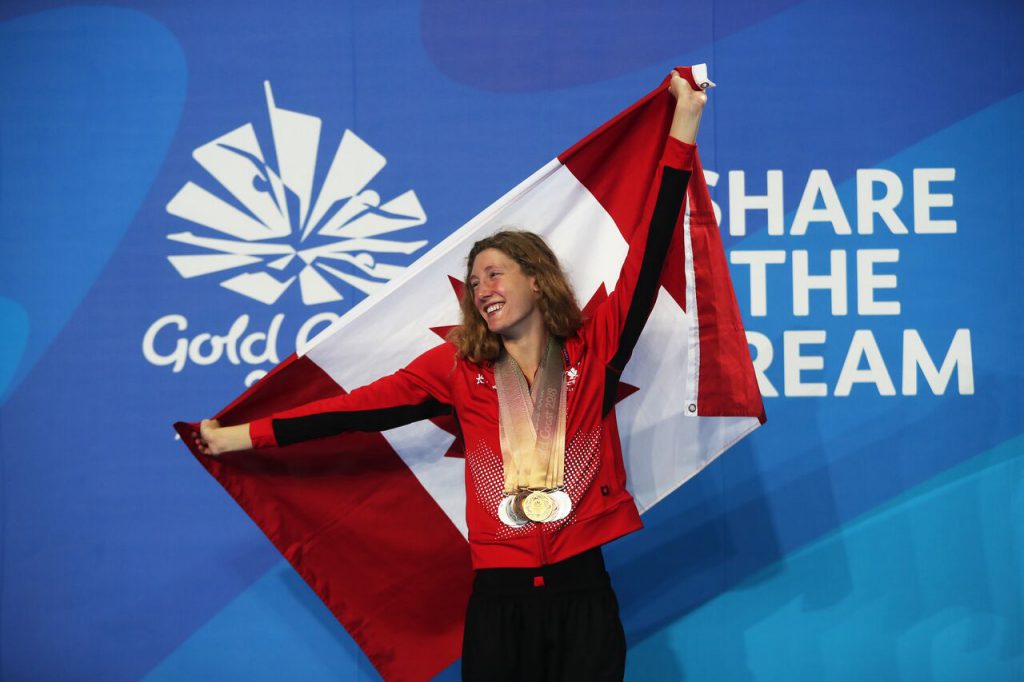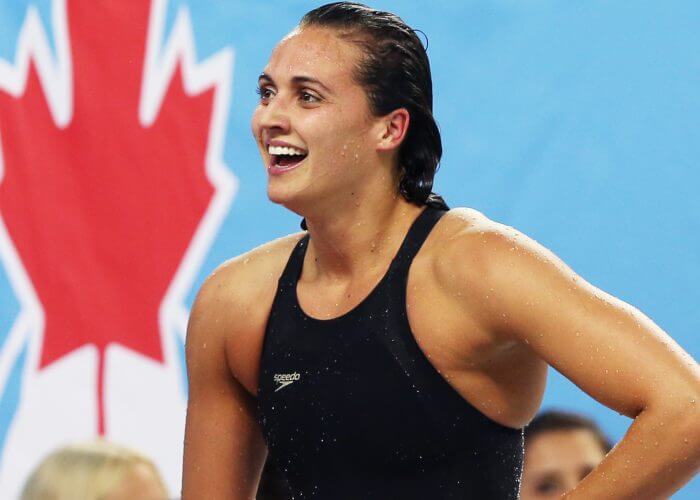Canada Looking To Crack Through A Four-Medal Frost, Girl Power Driving The Dream

Editorial content for the 2019 World Championships coverage is sponsored by FORM Swim Goggles.
See full event coverage.
Follow FORM on Instagram at @FORMSwim #swimwithform

Canada’s women claimed a tremendous six medals in the pool at Rio 2016, topped by gold for Penny Oleksiak in the 100m freestyle, with Kylie Masse, Hilary Caldwell and the two freestyle relays adding to Maple cheer.
The quartets represented the foundation stones of a big return to form and a place among the best five nations in the world for Canada’s women. By the time the team returned home from Rio, all the following has a medal to their name, beyond those already cited, from heats and finals: Sandrine Mainville; Chantal Van Landeghem; Taylor Ruck; Katerine Savard; Brittany MacLean; Kennedy Goss and Emily Overholt.
Since then, Masse has taken down the world 100m backstroke record, the world title in her treasury, and Ruck has both plateaued for a season and then sky-rocketed to 17 podiums for Canada in senior waters at world short-course, Commonwealth and Pan-Pac levels. Gwangju will mark her first World titles as a force to reckon with in numerous events. Add in Sydney Pickrem and her medley gains of late and the medal chances look healthy.
Six medals in 1978 represents the best haul ever for Canada, while a decline from strength in the 1980s began with one medal in 1991 on the way to no medals at all in years such as 1994, 2001 and 2003, two years out from five medals, including open water, at home in 2005. For most of the years since, 3-4 medals have set the tone.
Last time out, there was gold for Masse and three bronzes, for Pickrem and and two mixed relays. Canada has never won more than one gold medal at a single world championships.
At Montreal and in the years since, four medals has been tops for Canada in the pool – and at the last home meet 14 years ago, half the count came from the silvers won by Canadian men in freestyle relays.
In Gwangju, Canada is aiming to consolidate the strength of its women, while looking for the men to step up from a time, beyond Ryan Cochrane, of struggling to keep up in world waters. Success, says Canada’s High Performance Director John Atkinson, would be exceeding four medals, consolidating the strength of a women’s program, having the men make sound progress and having every swimmer leave the water better and faster than they were when leaving their blocks.
A quick fire Q&A with John Atkinson as the team limber up for battle July 21-28:

Kylie Masse – Photo Courtesy: Scott Grant
One year out from Tokyo, what’s the meaning of this meet?
For established athletes, it’s about performing in the final against their main competitors for Olympic medals in 2020. For our up-and-coming athletes, it’s about improving in the environment and taking a step forward on where they were in 2018.
What strengths are you hoping to build on in Gwangju?
We’re looking for our female team to continue to cement themselves into the Top 5 swimming nations in the world, and that our relay teams improve on their 2018 performances at Commonwealth Games and Pan Pacs.
What are the areas of relative weakness/room for improvement that you’d like to see gains on?
We’d like to see some of our men’s team step forward into semifinals and finals. The relays on the men’s side to make Olympic qualification. And our young men perform to their best in their first world championships and begin to realize the talent that they have.
Where are the medals coming from?
At the last four world championships, Canada has won three to four medals. Without putting pressure on any particular athletes, the women’s program, both in individual events and relays, are where our strongest opportunities lie.
What’s the meaning of success for you at the championships?
Success can be measured in multiple ways. The headline would be exceeding four medals in a world championships, that hasn’t happened since our home world championships in Montreal in 2005. Also, surpassing 17 finals, which was our result in 2017 and the most for Canada since 1978. On a personal level, each athlete performing faster than they did to make the team.
How relevant are Gwangju 2019 results to Tokyo 2020 prospects?
In general, the year before the Olympic Games is about opportunities for all the Canadian athletes competing around the world in different swim meets. For example, Kylie Masse won FISU Games in 2015, Penny Oleksiak and Taylor Ruck competed at the World Junior Championships. Who else will step forward after 2019?
.jpg)

- 2017 WORLD CHAMPIONSHIPS
- OFFICIAL MEET PAGE
- WATCH RACE VIDEOS
- LIVE STREAM
- DAY 1 SWIMMING RESULTS
- DAY 2 SWIMMING RESULTS
- DAY 3 SWIMMING RESULTS
- DAY 4 SWIMMING RESULTS
- DAY 5 SWIMMING REULTS
- DAY 6 SWIMMING RESULTS
- DAY 7 SWIMMING RESULTS
- DAY 8 SWIMMING RESULTS
- RESULTS FOR ALL AQUATIC SPORTS
- DAY 8 PRELIMS HEAT SHEETS
- DAY 8 FINALS START LISTS
- FORM Swim for Coaches
- FORM Swim Sponsorships
- FORM Swim Contests
- FORM Swim Media



